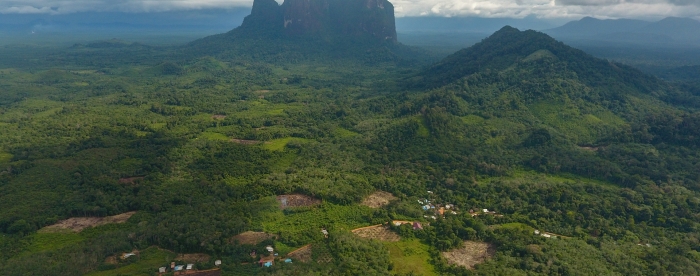News
Our stories ... ...

Indonesia - 15 April, 2021
Face-to-face meetings were central to the work of Tropenbos Indonesia until COVID-19 abruptly put an end to them in early 2020. Against all odds, the organization saw an opportunity to increase its outreach and involvement with stakeholders all over the country.
Members of the Tropenbos International network typically try to build bridges between communities, researchers, practitioners and policymakers. To do this, bringing people together is essential. Needless to say, COVID-19 has caused an abrupt shift. Each member of the network had to drastically change its ways: no more crowded workshops in community centres; no more presentations in large conference halls; and no more consultations in government offices.
Throughout the network, many of the meetings that used to be face to face now take place online, using video conferencing software. In some cases, the use of this software has created novel opportunities for outreach. This is best illustrated by Tropenbos Indonesia, which did not just make the switch from in-person to virtual meetings, but found a fundamentally new way to interact and engage with its target audiences.
Tropenbos Indonesia has ten people working from its headquarters in West Java, and eight more in the field office in West Kalimantan. Although its size is small, its ambitions are not. Tropenbos Indonesia aims to contribute to more sustainable and inclusive landscape management. For this, it gathers and analyses information, and facilitates active knowledge exchange between relevant stakeholders — at the landscape and national level. This is no small task, considering that Indonesia has many hundreds of government agencies, NGOs and research organizations, spread over about 6,000 inhabited islands.
Staff members of Tropenbos Indonesia used to spend a significant part of their time in meetings with NGOs and government representatives, both in the landscapes where they work and in the capital, Jakarta. When COVID-19 started to spread, such meetings were no longer possible. But Edi Purwanto, Director of Tropenbos Indonesia, was not planning to sit back and wait it out. The pandemic, he believed, presented an excellent opportunity to initiate an online webinar on the sustainable management of forested landscapes.
Under Purwanto’s enthusiastic leadership, Tropenbos Indonesia started organizing biweekly online seminars — every other Saturday afternoon — each on a different topic and with different speakers. Staff members developed a sophisticated technical set-up to enable smooth presentations and interactions with participants. Moreover, to attract people to the webinar, Purwanto and his team realized it was important to have a consistent time slot, to select topical issues, to disseminate invitations widely, and to invite well-known speakers.
The first webinar took place in August 2020. It focussed on the options for biodiversity conservation outside of protected areas, and was attended by 532 people. Since then, the number of participants has risen steadily. In March 2021, more than 1,500 people took part in the fourteenth webinar, on the implications of a new government policy (the ‘job creation act’) for the forest sector.
In less than a year, the webinar has managed to grow into a vibrant place for knowledge exchange for hundreds of professionals, including government agencies, universities and NGOs — from all corners of the archipelago. Purwanto couldn’t be happier. The webinars are enabling Tropenbos Indonesia to play a more prominent role as knowledge broker. And because of the webinars, the organization can reach more people than it could before, while reducing the costs of traveling and decreasing its carbon footprint. Although the restrictions on face-to-face meetings may be lifted at some point, the webinars are here to stay.